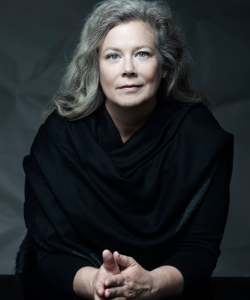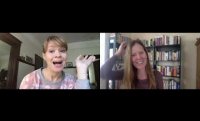Genre: Creative Nonfiction
Wrestling
In “The World of Wrestling,” an essay published in Mythologies by Roland Barthes, he examines the allure and extravagant nature of wrestling, writing that “wrestling is not a sport, it is a spectacle, and it is no more ignoble to attend a wrestled performance of Suffering than a performance of the sorrows of Arnolphe or Andromaque.” Throughout the essay, Barthes constructs a philosophical argument that underpins the theatrical pathos behind the staged sport, elevating something that may be seen as common with an artistic analysis. Choose a form of entertainment that is often considered ordinary and write an essay arguing that there is more than meets the eye.
Ten Questions for Jana Larson

“I can’t imagine myself without this book.” —Jana Larson, author of Reel Bay
Emily Rapp Black: Throw Us a Line
“Everyone can do a paragraph.” Emily Rapp Black speaks about working with a writing partner during the pandemic in this video for the Throw Us a Line series hosted by Lighthouse Writers Workshop program director Andrea Dupree. Black’s new memoir, Sanctuary (Random House, 2021), is featured in Page One in the January/February issue of Poets & Writers Magazine.
Upcoming Contest Deadlines
In these uncertain times, set aside a weekend to escape into your writing and submit to contests. With deadlines of January 30 or January 31, these awards include grants for women writers and a prize for a manuscript on the subject of music. All feature a cash prize of $1,000 or more.
AKO Caine Prize for African Writing: A prize of £10,000 (approximately $12,860) is given annually for a previously published short story by an African writer. Shortlisted writers will receive £500 (approximately $643). Writers who were born in Africa, who are African residents, or who have a parent who is African by birth or nationality are eligible. Deadline: January 31. Entry fee: none.
Austin Community College Balcones Prizes: Two prizes of $1,500 each are given annually for a poetry collection and a book of fiction published during the previous year. Deadline: January 31. Entry fee: $25 for poetry and $30 for fiction.
Black Lawrence Press Big Moose Prize: A prize of $1,000, publication by Black Lawrence Press, and 10 author copies is given annually for a novel. The contest is open to traditional novels “as well as novels-in-stories, novels-in-poems, or other hybrid forms that contain within them the spirit of a novel.” The editors will judge. Deadline: January 31. Entry fee: $25.
Crazyhorse Writing Prizes: Three prizes of $2,000 each and publication in Crazyhorse are given annually for a poem, a short story, and an essay. Yona Harvey will judge in poetry, Rumaan Alam will judge in fiction, and Sabrina Orah Mark will judge in nonfiction. All entries are considered for publication. Deadline: January 31. Entry fee: $20 (includes subscription).
Fish Publishing Short Memoir Prize: A prize of €1,000 (approximately $1,170) and publication in the Fish Publishing anthology is given annually for a short memoir. The winner is also invited to give a reading at the West Cork Literary Festival in July 2021. Blake Morrison will judge. Deadline: January 31. Entry fee: €18 (approximately $21) for online entries or €20 (approximately $23) for postal entries.
Ghost Story Screw Turn Flash Fiction Competition: A prize of $1,000 and publication on the Ghost Story website and in the 21st Century Ghost Stories anthology will be given annually for a flash fiction piece with a supernatural or magical realism theme. The editors will judge. Deadline: January 31. Entry fee: $15.
Iowa Review Awards: Three prizes of $1,500 each and publication in Iowa Review are given annually for works of poetry, fiction, and nonfiction. Tracie Morris will judge in poetry, Jamel Brinkley will judge in fiction, and Melissa Febos will judge in nonfiction. All entries are considered for publication. Deadline: January 31. Entry fee: $20.
Main Street Rag Poetry Book Award: A prize of $1,200, publication by Main Street Rag, and 50 author copies is given annually for a poetry collection. The editors and previous winners will judge. All entries are considered for publication. Deadline: January 31. Entry fee: $25 entry fee ($27 for electronic submissions).
Masters Review Short Story Award for New Writers: A prize of $3,000 and publication in Masters Review is given twice yearly for a short story by an emerging writer. The winning story will also be reviewed by a select group of literary agents. Writers who have published a book with a circulation of 5,000 or more copies are ineligible. Helen Oyeyemi will judge. Deadline: January 31. Entry fee: $20.
Money for Women/Barbara Deming Memorial Fund Individual Artists Grants for Women: Grants of up to $1,500 each are given in alternating years to feminist poets, fiction writers, and nonfiction writers who are citizens of the United States or Canada. The current round of grants will be awarded to poets and nonfiction writers. Deadline: January 31. Entry fee: $25.
New Millennium Writings New Millennium Writing Awards: Four prizes of $1,000 each and publication in New Millennium Writings are given twice yearly for a poem, a short story, a work of flash fiction, and a work of creative nonfiction. Previously unpublished works or works that have appeared in a journal with a circulation of under 5,000 are eligible. The editors will judge. Deadline: January 31. Entry fee: $20.
North Carolina Writers’ Network Thomas Wolfe Fiction Prize: A prize of $1,000 is given annually for a short story. The winning story will also be considered for publication in Thomas Wolfe Review. Therese Anne Fowler will judge. Deadline: January 30. Entry fee: $25.
Regal House Publishing Terry J. Cox Poetry Award: A prize of $1,000 and publication by Regal House Publishing is given annually for a poetry collection. Martha Kalin will judge. Deadline: January 31. Entry fee: $25.
Schaffner Press Nicholas Schaffner Award for Music in Literature: A prize of $1,000 and publication by Schaffner Press is given annually for a poetry collection, a novel, a short story collection, an essay collection, or a memoir that “deals in some way with the subject of music and its influence.” Deadline: January 31. Entry fee: $25.
Visit the contest websites for complete guidelines, and check out the Grants & Awards database and Submission Calendar for more contests in poetry, fiction, and creative nonfiction.
Pretend It’s a City
Directed by Academy Award winner Martin Scorsese, Pretend It’s a City features the return of sardonic writer and public speaker Fran Lebowitz in conversation with the director as she shares anecdotes about her early life and career in New York City in the 1970s. The Netflix series continues the partnership of the longtime friends, who worked together on the 2010 HBO documentary Public Speaking.
Manifesting
Frank O’Hara’s tongue-in-cheek manifesto “Personism,” published in the magazine Yugen in 1959, argues against using abstraction in poetry and advocates for a movement, “which nobody knows about,” that puts the poem squarely between the poet and the person, comparing the act of writing a poem to picking up a telephone to speak to a loved one. If you were to write a manifesto describing your preferences when it comes to writing an essay, what would you call it? Write a short manifesto that explains how you came to your writing style and includes a metaphor that best describes your intentions as an essayist. Are your essays like hard candy or perhaps like peeling an onion?
GalleyCrush: White Magic

Elissa Washuta’s White Magic, forthcoming from Tin House on April 27, 2021.
Resisting Epiphany
In Randon Billings Noble’s Literary Hub essay “How to Render Epiphanies in Nonfiction Without Getting Didactic,” she writes about resisting the need to prove a thesis in a work of nonfiction. “An essay can also muse, warn, wonder, wander, teach, play, lilt, explore, or, in the words of Jane Alison, meander, spiral, explode.” Write an essay that resists reaching a conclusion or a lesson and instead reflects on the details of an experience. How can the details of a seemingly simple scene provide readers as much of an impact as a more traditional conclusion?
Upcoming Contest Deadlines
Resolving to carve out more time for your creative practice in 2021? Ring in the new year by submitting to writing contests. With deadlines of either January 14 or January 15, these awards include two residencies earmarked for Texas writers, as well as an opportunity for a nonfiction writer to spend creative time in a desert environment. All offer a cash prize of $500 or more.
Asheville Poetry Review William Matthews Poetry Prize: A prize of $1,000 and publication in Asheville Poetry Review is given annually for a single poem. The winner is also invited to give a reading at Malaprop’s Bookstore in Asheville, North Carolina. Quincy Troupe will judge. All entries are considered for publication. Deadline: January 15. Entry fee: $20.
Australian Book Review Calibre Essay Prize: A prize of $5,000 AUD (approximately $3,807) is given annually for an essay. A second-place prize of $2,500 AUD (approximately $1,903) will also be given. The winners will be published in Australian Book Review. Sheila Fitzpatrick, Billy Griffiths, and Peter Rose will judge. Deadline: January 15. Entry fee: $25 AUD (approximately $19).
Autumn House Press Rising Writer Prizes: Two prizes of $500 each and publication by Autumn House Press will be given annually for a debut poetry collection and a debut book of fiction by writers who are 36 years old or younger. The winners will each also receive a $500 grant for travel and book promotion. Matthew Dickman will judge in poetry and Maryse Meijer will judge in fiction. All finalists will be considered for publication. Deadline: January 15. Entry fee: $25.
Burnside Review Press Book Award: A prize of $1,000, publication by Burnside Review Press, and 10 author copies is given annually for a poetry collection. Jennifer Chang will judge. Deadline: January 15. Entry fee: $25 (includes one title from the press’s catalogue).
Colorado Review Colorado Prize for Poetry: A prize of $2,000 and publication by the Center for Literary Publishing is given annually for a poetry collection. Sherwin Bitsui will judge. Deadline: January 14. Entry fee: $28 (includes subscription).
Ellen Meloy Fund Desert Writers Award: A prize of $5,000 is given annually to enable a creative nonfiction writer “whose work reflects the spirit and passions for the desert embodied in Ellen Meloy’s writing” to spend creative time in a desert environment. Deadline: January 15. Entry fee: $15.
French-American Foundation Translation Prizes: Two prizes of $10,000 each are given annually for translations from French into English of a book of fiction and a book of nonfiction (including creative nonfiction) published during the previous year. A jury of translators and literary professionals will judge. Deadline: January 15. Entry fee: none.
New American Press Poetry Prize: A prize of $1,500, publication by New American Press, and 25 author copies is given annually for a poetry collection. Quan Barry will judge. Deadline: January 15. Entry fee: $20.
North Carolina Writers’ Network Rose Post Creative Nonfiction Competition: A prize of $1,000 is given annually for an essay “that is outside the realm of conventional journalism and has relevance to North Carolinians.” The winning essay will also be considered for publication in Ecotone. Destiny O. Birdsong will judge. Deadline: January 15. Entry fee: $12 ($10 for NCWN members).
Poetry Society of Virginia North American Book Award: A prize of $1,000 will be given annually for a book of poetry published during the previous year. The winner will be invited to read at the spring festival of Poetry Society of Virginia in May 2021. Self-published books and books that have previously received any other awards are ineligible. Luisa Igloria will judge. Deadline: January 15. Entry fee: $35 ($25 for Poetry Society of Virginia members).
University of Texas Dobie Paisano Fellowships: Two residencies, cosponsored by the Texas Institute of Letters, at a rural retreat west of Austin are given annually to writers who are native Texans, who have lived in Texas for at least three years, or who have published significant work with a Texas subject. The six-month Jesse H. Jones Writing Fellowship is given to a writer in any stage of their career and includes a grant of $18,000. The four-month Ralph A. Johnston Memorial Fellowship is given to a writer who has demonstrated “publishing and critical success” and includes a grant of $24,000. Deadline: January 15. Entry fee: $20 ($30 to enter both competitions).
Visit the contest websites for complete guidelines, and check out the Grants & Awards database and Submission Calendar for more contests in poetry, fiction, and creative nonfiction.






